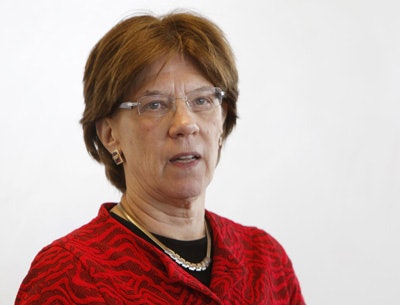With the second travel ban issued by President Donald J. Trump being held in abeyance, colleges and universities are urging a federal court that will hear the case to consider how the ban will undermine diversity in higher education.
“We are concerned that the executive order could limit our ability to attract quality students and faculty from around the world who enhance our educational experience, enrich our culture, and contribute to the economy,” said Mary Jeka, senior vice president of university relations and general counsel for Tufts University.
 Mary Jeka is senior vice president of university relations and general counsel for Tufts University.
Mary Jeka is senior vice president of university relations and general counsel for Tufts University.The recently filed amicus brief — known as a “friend of the court” brief and filed in the United States Court of Appeals for the Fourth Circuit — lays out the manifold ways in which the travel ban contravenes the global mission of America’s higher education enterprise. It was filed by 31 top-tier universities that range from Georgetown to Stanford
“It would be absurd for us to believe that we could solve problems for the world without being of the world, open to the world, and learning from and with colleagues from around the world, in a substantial way,” said L. Rafael Reif, president of Massachusetts Institute of Technology, or MIT, one of the universities that joined the brief. Reif noted that more than 40 percent of MIT’s faculty and graduate students, respectively, were born outside the U.S.
“When we bump into each other, intellectually — with our different life experiences, educational backgrounds, cultures and perspectives — we push each other to think in new ways and see more clearly,” Reif said in a statement provided to Diverse.
The travel ban sought to suspend entry into the United States of nationals of six Muslim-majority countries — Iran, Libya, Somalia, Sudan, Syria, and Yemen — for a period of 90 days.
Two federal judges have blocked the ban — as did a federal judge with the first iteration of the travel ban, which included Iraq.
The White House has appealed the case in the U.S. Court of Appeals for the Fourth Circuit, which is in Richmond, Virginia. A hearing has been set for May 8.
The amicus brief filed by Tufts, MIT and a bevy of other universities spells out in great detail some of the specific ways that the travel ban would affect their institutions.
“For example, Princeton has more than 50 students and employees from the six affected countries, and its graduate school received approximately 150 applications for fall 2017 alone (and more than 700 applications in the past five years) from students from those nations,” the brief states.
But much of the brief explains the macro-level ways in which the ban would hurt institutions of higher education — and ultimately national security itself — as they seek top talent from around the world.
“The benefits of international diversity to American universities are manifold. And it is not merely the classroom experience that will suffer,” the brief states. “American laboratories, which are a major driver of our economy, depend on their ability to attract the best trainees and postdoctoral fellows from around the world, as well as their collaborations with foreign scientists in areas of science that have no defense or security implications.”
The brief also makes an economic case against the ban, noting that international students “make significant contributions to the United States economy.”
“One estimate provides that international students directly contributed $32.8 billion to the United States economy and supported or contributed to the creation of 400,000 American jobs in the 2015-16 academic year,” the brief states.
The brief states, however, that the benefits from international students, faculty, and scholars at American universities are “not just economic.”
“As noted above, these individuals make significant discoveries and contributions in their fields,” the brief states. “Since 2000, forty percent of all American Nobel prize winners in Chemistry, Medicine, and Physics have been immigrants — and in 2016, all six American winners of the Nobel Prize in economics and scientific fields were immigrants.”
Jamaal Abdul-Alim can be reached at [email protected] or follow him on Twitter @dcwriter360.


















